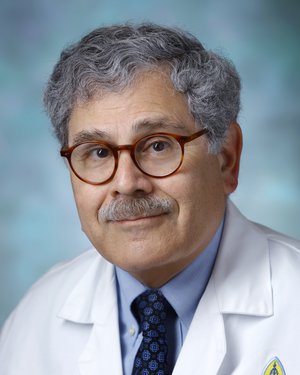Research Lab Results
-
Clare Rock Lab
Dr. Clare Rock is an assistant Professor of Medicine, Division of Infectious Diseases at the Johns Hopkins University School of Medicine, Associate hospital Epidemiologist at the Johns Hopkins Hospital, and Faculty Member at Armstrong Institute for Patient Safety and Quality. Her research interest focuses the prevention of pathogen transmission in the hospital environment. This includes novel strategies of improving patient room cleaning and disinfection, including human factors engineering approaches, and conducting robust clinical trials to examine effectiveness of ""no touch"" novel technologies such as UV-C light. She has particular interest in carbapenem-resistant Enterobacteriaceae transmission in the hospital environment, including outbreak management, and transmission and epidemiology of Clostridium difficile. Her other area of interest is diagnostic stewardship, and the behavioral, cultural and human factors aspects of implementation of initiatives to enhance appropriate use of diagnostic tests. She leads a national initiative, as part of the High Value Practice Academic Alliance, examining strategies for appropriate testing for Clostridium difficile. This is a wider implementation of work that Dr. Rock conducted with The Johns Hopkins Health System facilities. Dr. Rock has multiple sources of grant funding including from the Agency of Healthcare Research and Quality, Centers for Disease Control and Prevention, and industry. Dr. Rock is Vice Chair of the Society for Healthcare Epidemiology of America Research Network, and serves on the SHEA research committee. Dr. Rock earned her M.B.B.Ch. at the University College Dublin School of Medicine, National University of Ireland, and her MS masters of clinical science of research at the University of Maryland, where she received the MS scholar award for epidemiology.
-
Clinical Laboratory and Biomarkers Core
The Clinical Laboratory and Biomarkers Cores will coordinate access to laboratory expertise, testing, training, specimen repositories and Good Clinical Laboratory Practices (GCLP). The goals of this core are to assure that all JHU HIV investigators have access to and utilize appropriate, validated and, where applicable, certified laboratory assays. The core will also maintain a biomarker specimen repository for storage cataloguing and utilization of biological specimens. -
Cochlear Neurotransmission Group
The Cochlear Neurotransmission Group studies the generation and propagation of neural signals in the inner ear. Our laboratories use biophysical, electrophysiological, molecular biological and histological methods to determine fundamental molecular mechanisms by which neurotransmitters are released from primary sensory cells ('hair cells') to excite second order neurons carrying information to the brain. We apply these same techniques to study inhibitory feedback produced by brain neurons that project to and regulate the sensitivity of the cochlea. -
Constance Monitto Lab
The Constance Monitto Lab conducts clinical research on pediatric pain management as well as basic science studies on chemotherapy resistance. In our pediatric pain management research, we work to assess the impact of low-dose opioid antagonism on opioid-related side effects, such as nausea and vomiting. We also analyze data on current methods of pediatric pain management in the United States. In addition, our team uses basic science studies to assess the success of epigenetic gene regulation on the development of resistance to chemotherapeutic agents in cancer. -
Cynthia Sears Laboratory
Work in the Cynthia Sears Laboratory focuses on the bacterial contributions to the development of human colon cancer and the impact of the microbiome on other cancers and the therapy of cancer. The current work involves mouse and human studies to define how enterotoxigenic Bacteroides fragilis, pks+ Escherichia coli, Fusobacterium nucleatum, biofilms and the colonic microbiota induce chronic colonic inflammation and colon cancer. Prospective human studies of the microbiome and biofilms in screening colonoscopy are in progress as are studies to determine if and how the microbiome impacts the response of individuals with cancer to immunotherapy and other cancer therapies.
-
Chloe Thio Lab
Research in the Chloe Thio lab focuses on several areas. First, HBV virology and immunology in HBV monoinfected and HIV-HBV co-infected individuals that will ultimately help develop a cure for HBV. Second, HCV infection in men who have sex with men. Third, non-alcoholic fatty liver disease with a focus on HIV-infected individuals. Fourth, host genetic determinants of spontaneous HBV recovery and HCV clearance.
-
Casey Overby Lab
Research in the Casey Overby Lab focuses on the intersection of public health genomics and biomedical informatics. We’re currently developing applications to support the translation of genomic research to clinical and population-based health care settings. We’re also working to develop knowledge-based ways to use big data — including electronic health records — to improve population health.
-
Center for Epithelial Disorders
The Johns Hopkins Center for Epithelial Disorders focuses on research into the physiology and pathophysiology of epithelial cells (cells that line the cavities and interior surfaces of the body) of the gastrointestinal (GI) tract, liver, pancreas and kidney. Specifically, the center’s research seeks to: -Understand the mechanisms regulating the activity of transport proteins (including channels) of epithelial cells Characterize the mechanisms by which polarity of epithelial cells are maintained -Investigate the mechanisms controlling transcription of epithelial-specific genes Understand the pathophysiological basis of GI and renal diseases that involve the preceding three components -The center also provides a framework for training fellows in gastroenterology and hepatology to become independent investigators. The center is funded primarily through individual investigator-initiated extramural research grant support from the National Institutes of Health (NIH) as well as multi-investigator grants including RO1, PO1, UO1 and R24.
-
Gabsang Lee Lab
Human induced pluripotent stem cells (hiPSCs) provide unprecedented opportunities for cell replacement approaches, disease modeling and drug discovery in a patient-specific manner. The Gabsang Lee Lab focuses on the neural crest lineage and skeletal muscle tissue, in terms of their fate-determination processes as well as relevant genetic disorders. Previously, we studied a human genetic disorder (familial dysautonomia, or FD) with hiPSCs and found that FD-specific neural crest cells have low levels of genes needed to make autonomous neurons--the ones needed for the ""fight-or-flight"" response. In an effort to discover novel drugs, we performed high-throughput screening with a compound library using FD patient-derived neural crest cells. We recently established a direct conversion methodology, turning patient fibroblasts into ""induced neural crest (iNC)"" that also exhibit disease-related phenotypes, just as the FD-hiPSC-derived neural crest. We're extending our research to the neural crest's neighboring cells, somite. Using multiple genetic reporter systems, we identified sufficient cues for directing hiPSCs into somite stage, followed by skeletal muscle lineages. This novel approach can straightforwardly apply to muscular dystrophies, resulting in expandable myoblasts in a patient-specific manner. -
Green Group
The Green Group is the biomaterials and drug delivery laboratory in the Biomedical Engineering Department at the Johns Hopkins University School of Medicine. Our broad research interests are in cellular engineering and in nanobiotechnology. We are particularly interested in biomaterials, controlled drug delivery, stem cells, gene therapy, and immunobioengineering. We are working on the chemistry/biology/engineering interface to answer fundamental scientific questions and create innovative technologies and therapeutics that can directly benefit human health.

